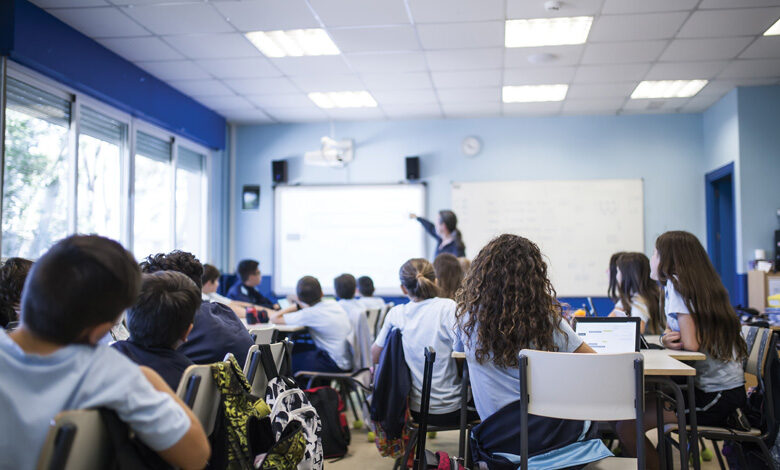Integrated Education Strategy described as ‘paper-thin’

The Department of Education has published a new integrated education strategy which does not set any targets for increased pupil or school numbers in integrated education, and does not specify any monetary needs.
Integrated education strategy
Following the passage of the Integrated Education Act in 2022, the Department of Education is legally obliged to give “stronger support” to integrated education.
The legislation, which was brought forward by Alliance Party MLA Kellie Armstrong, means the Department has to grow the number of integrated school places and the number of children educated in them.
The newly-published Integrated Education Strategy has been critiqued for not setting targets for growth of pupil or school numbers, as well as a failure to specify how much money the Department will spend on growing integrated education.
The strategy document states that, between April 2022 and March 2023 the Department created an additional 95 places for pupils in integrated schools through temporary variation.
It further sets out 15 actions that the Department of Education will undertake, including assessing demand for integrated education, publishing data on said demand, and updated information and guidance for parents.
However, the strategy does not specify the amount of pupils or schools it aims to have in an integrated education setting, nor does it state the amount of money to be allocated to integrated education in the Department of Education’s spending.
What is known is that, in the 2022/23 fiscal year, £111 million was spent on integrated education in Northern Ireland, which was roughly 8 per cent of the budget for the Department of Education.
The strategy document states that “a budget allocation has been identified to support implementation of this initial strategy”. No figure was attributed within the strategy but it is expected that a forthcoming action plan will identify costs of implementation.
It continues: “As the implementation of the strategy develops, a fuller and more detailed assessment of budget requirements will be needed.”
Under Section 9 (1) (e) of the Integrated Education Act 2022, it is stipulated that the Department of Educations sets out an action plan for further implementation, although it is not clear how this will manifest itself. The strategy document states that the action plan will be prepared in consultation with “persons with knowledge and experience of integrated schools including teachers, governors, pupils, families, and sectoral and community bodies”.
Adam McGibbon from Integrated AlumNI, a representative group for former integrated education students, critiqued the strategy as aiming to grow integrated education at a “snail’s pace”.
“Prime Minister Rishi Sunak MP suggested that integrated education ‘should be the norm, not the exception’, but this paper-thin strategy ensures that for many Northern Ireland parents and kids, they still won’t even have the choice of an integrated school,” McGibbon said.
The Department of Education will carry out a public consultation on the action plan over the summer, with the aim of having all consultations submitted by September 2023, meaning that the action plan will not be operational for the next academic year.
SEN place shortfall
A further challenge facing the Department of Education is a potential shortage of SEN pupil places for the upcoming academic year, with the Education Authority (EA) warning of a potentially “significant shortfall” in places in special schools in the upcoming academic year.
An Education Authority committee meeting on 6 April 2023 was told that there is a need for 853 additional pupil places in special schools and 400 places in specialist classes in mainstream schools.
In the 2022/23 academic year, there were almost 7,000 pupils in Northern Ireland’s 39 special schools and a further 3,200 were in specialist provision in mainstream schools.
Specialist provision in mainstream schools classifies special classes or units which provide extra support to pupils with additional needs in primaries and post-primaries.
In a letter to heads of school and governors, the EA said there was a 15 per cent rise in the number of children with a statement of Special Educational Needs (SEN) seeking a school place in 2023.
To cope with those numbers, special schools also need an additional 76 classrooms by September 2023, estimated to cost around £80 million. However, the EA committee heard that, at present, only 18 of those extra classrooms were confirmed for the start of the new school year, and an additional 49 classes will be needed in mainstream schools.
Given the austerity budget currently facing the Department of Education, it is unclear whether these needs will be met.






